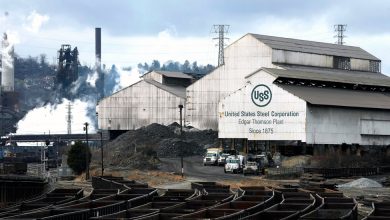Prepare for Interest Rate Liftoff


The bond market is sending a message to Jay Powell and the Fed.Credit…Pool photo by Jonathan Ernst/EPA, via Shutterstock
The bond market’s mixed message
For much of recent history, a rise in bond yields signaled that a stronger economy was ahead. Yesterday, the yield on the 10-year U.S. Treasury note jumped to 2.14 percent, the highest it has been since 2019, and about four times higher than its pandemic low point in 2020.
That could be a good sign for the Fed, which begins a two-day policy meeting today. The Fed chairman, Jay Powell, has all but promised that the central bank will announce “liftoff” tomorrow by raising interest rates by a quarter point, the first in a series of increases. The Fed is worried about inflation, which is the highest it has been in decades, and Powell has pointed to Paul Volcker, the former Fed chair who is revered for taming the high inflation of the 1970s and early 1980s by aggressively raising interest rates, as an intellectual hero.
A strong economy could give the Fed more room to raise rates without causing a recession, unlike during Volcker’s time. But that may not be the signal that bond markets are sending. Here’s what the recent jump in rates might mean for the Fed:
Why are bond yields rising? It’s not necessarily because the economy is improving: Last week, Goldman Sachs cut its forecast for U.S. growth this year to 2.9 percent, down from an expectation of 3.5 percent at the beginning of this year. Fears of accelerating inflation are a more likely reason rates are drifting higher. “After several decades in which economic, financial or political shocks invariably caused interest rates to fall, markets may have to relearn that the opposite can also be true,” Goldman’s chief economist, Jan Hatzius, wrote in a recent report. Google searches for “stagflation,” the combination of stagnant growth and high inflation that bedeviled the 1970s, have been running high lately.
Is the war in Ukraine a factor? Yes, but not directly. The U.S. and its allies have hit Russia with severe economic sanctions, including some targeting its large energy sector. Higher oil prices can be a major driver of inflation, putting upward pressure on interest rates. At the same time, new Covid restrictions in China could disrupt supply chains, another factor that could make inflation linger (more on that below).
How high could rates go? With economic growth looking shakier, there is likely a ceiling on how high the Fed will raise rates. (Still, futures markets are pricing in seven quarter-point increases this year.) One of the reasons interest rates were raised so dramatically in the 1970s and 1980s was that the Fed was slow to act in response to persistently high inflation. Observers say that because the Fed is acting sooner this time around, it might not need to raise rates as sharply (and it could avoid tipping the economy into a deep recession).
“The one really big difference — huge difference, consequential difference — is that the Fed, and the country, lived through the 1970s. I think the Fed is determined not to let us get there,” Donald Kohn, the former vice chairman of the Fed, told The Times.
HERE’S WHAT’S HAPPENING
Nickel trading will resume. The London Metal Exchange will restart trading in the metal tomorrow, after buying and selling was halted last week amid unprecedented price swings. Tsingshan, the Chinese nickel producer that faced billions in paper losses from the market turmoil, reached a deal with its banks for more time to settle its wrong-way trading bets.
Sarah Bloom Raskin’s Fed nomination appears doomed. Key centrist senators, notably the Democrat Joe Manchin of West Virginia, said they wouldn’t support her for the role of top bank supervisor. With Democrats’ razor-thin majority in the Senate, that makes Raskin unlikely to win confirmation, though the White House has yet to withdraw her nomination.
Sewer data suggests a potential looming spike in Covid cases. More than a third of wastewater samples collected by the C.D.C. earlier this month show rising coronavirus levels, even as reported cases lag, Bloomberg reports.
Environmental activists plan to sue Shell over climate change plans. ClientEarth, which owns a stake in the oil giant, said it would file a lawsuit against the company’s board, arguing it failed to adopt a suitable strategy. This comes after a Dutch court ordered Shell to drastically reduce its carbon emissions.
Discovery’s C.E.O. receives a potential blockbuster payday. David Zaslav was given a compensation package worth over $246 million last year, with the company citing his successful takeover of WarnerMedia. Most of that is in stock options that have a seven-year vesting period and a strike price that’s 50 percent higher than where Discovery trades now.
The latest on the Russia-Ukraine war
-
Britain and the E.U. banned the export of luxury goods to Russia. The Russian central bank said it would stop purchasing gold from banks amid a spike in demand from Russian people.
-
Chinese officials increasingly believe their country will emerge a winner from the war in Ukraine, as a top U.S. official warned a Beijing counterpart about the country’s ties to Russia.
-
Citigroup said it would further reduce its presence in Russia. Meanwhile, Silicon Valley venture capital firms are trying to cut ties with Russian backers.
-
Major banks are worried that Moscow-linked hackers will attack the SWIFT payments system in reprisal for sanctions on Russia.
-
For up-to-the-minute news, see The Times’s live blog and updated maps.
“The vast majority of Russian people are very clearheaded and understand the dark gravity of the situation they’re in. And, at the end of the day, they appreciate a good pizza.”
— Christopher Wynne, an American whose company owns the franchise agreements for 190 Papa John’s pizza restaurants in Russia, and has no plans to shut them down.
The Russia-Ukraine War and the Global Economy
Rising concerns. Russia’s invasion on Ukraine has had a ripple effect across the globe, adding to the stock market’s woes and spooking investors. The conflict has already caused dizzying spikes in energy prices, and could severely affect various countries and industries.
The cost of energy. Oil prices already were the highest since 2014, and they have continued to rise since the invasion. Russia is the third-largest producer of oil, so more price increases are inevitable.
Gas supplies. Europe gets nearly 40 percent of its natural gas from Russia, and it is likely to be walloped with higher heating bills. Natural gas reserves are running low, and European leaders worry that Moscow could cut flows in response to the region’s support of Ukraine.
Food prices. Russia is the world’s largest supplier of wheat; together, it and Ukraine account for nearly a quarter of total global exports. Countries like Egypt, which relies heavily on Russian wheat imports, are already looking for alternative suppliers.
Shortages of essential metals. The price of palladium, used in automotive exhaust systems and mobile phones, has been soaring amid fears that Russia, the world’s largest exporter of the metal, could be cut off from global markets. The price of nickel, another key Russian export, has also been rising.
Financial turmoil. Global banks are bracing for the effects of sanctions intended to restrict Russia’s access to foreign capital and limit its ability to process payments in dollars, euros and other currencies crucial for trade. Banks are also on alert for retaliatory cyberattacks by Russia.
Another inflation headache
As China presses on with its “zero Covid” policy, a surge of cases has led the government to order lockdowns in some of its largest factory cities. Among them are Shenzhen, a major tech manufacturing hub, and Shanghai, China’s business center. The shutdowns threaten to further disrupt global supply chains, which could amplify already high inflation. Here’s what people are saying about it:
-
“The lockdown couldn’t have come in a worse city at a worse time. If this lasts beyond a week or two, it will be a backbreaker for production.” — Dan Ives of Wedbush Securities, to The New York Post
-
“Shenzhen is China’s Silicon Valley, so shutting it down will raise the cost of exporting electronics. Why would China shut down a vital export region? Next door is Hong Kong with currently the highest daily death rates from Covid ever reported.” — Alex Tabarrok of George Mason University, to DealBook
-
“If Chinese shutdowns weren’t incorporated in your inflation forecast two months ago, then you are doing forecasts wrong.” — Jason Furman of Harvard University, on Twitter
Exclusive: S.E.C. Commissioner Lee is leaving
Allison Herren Lee will step down as a commissioner at the S.E.C., DealBook is first to report. The announcement comes exactly one year after Lee — as acting chair — declared that climate change disclosures would be a priority for the agency. In doing so, Lee, who was appointed to fill a Democratic seat on the commission by President Donald Trump in 2019, paved the way for her successor, Gary Gensler, who took over last April. The commission will hold a vote on proposed environmental disclosure rules next week.
Lee drew political fire for setting goals in an interim leadership role, but she was praised by some colleagues for the decisive approach. “As acting chair she brought swift focus to important investor issues, such as climate-related disclosures,” said Gensler. “I have been fortunate to rely on Allison’s expertise.”
Lee “put the market on notice” about environmental disclosures,said Robert Jackson, a former S.E.C. commissioner. Last year, Lee invited public comment on these disclosures long before any proposals were on the table, allowing industry players to air their concerns and issues in advance. That public debate positioned the agency “to develop a thoughtful rule in this critical area,” Jackson said. “Lee has set the standard by which all future acting chairs of financial agencies will be judged.”
Early experience in the energy industry has informed her work. “I began working in the oil business while in college to help pay for my business degree in mineral management,” Lee told DealBook. “My first professional job was as what we then called a ‘landman,’” she said, negotiating with landowners to acquire leases for energy exploration. Lee later went to law school on a full scholarship, became a law firm partner and joined the S.E.C.’s enforcement division. “In retrospect, that time as a woman in the oil business in the late ’70s and early ’80s was something of a professional crucible,” she said. “Back then, I didn’t even know how I would get through law school, much less expect to occupy this role and be on the cusp of voting on climate change disclosures.”
It might be a long goodbye. The Biden administration has struggled to seat some nominees, so Lee’s notice may not bring swift change at the S.E.C. She will remain after her term ends in June if a replacement isn’t confirmed, though she is eager to begin a visiting professorship in Italy that she delayed to become a commissioner. Her departure would leave two slots open on the agency’s five-member board, including one recently vacated by Elad Roisman, a Republican. No more than three commissioners can belong to the same political party.
THE SPEED READ
Deals
-
An investor group led by Elliott Management is reportedly in talks to buy the TV-ratings provider Nielsen for about $15 billion. (WSJ)
-
The chat platform Discord is said to be interviewing banks ahead of a potential direct listing, while the Indonesian tech giant GoTo plans to go public via I.P.O. (Bloomberg, FT)
-
Goldman Sachs faces criticism for lending $150 million to the coal producer Peabody Energy, despite pledging to stop financing thermal coal miners. (FT)
Policy
-
Inside California’s efforts to create the first state regulator of online privacy. (NYT)
-
The F.T.C. is refining a potentially devastating punishment for tech companies: forcing them to destroy algorithms built using ill-gotten user data. (Protocol)
-
How Rivian’s plan for an electric truck factory has become a political flash point in Georgia. (NYT)
Best of the rest
-
“Inside Apple’s Decision to Blow Up the Digital Ads Business” (The Information)
-
Europe is erring by seeking to limit the power of the tech industry without investing in cyberdefense, the C.E.O. of the consultancy Palantir wrote in a public letter. (Palantir)
-
Anna Sorokin, the convicted con artist who swindled Manhattan’s elite, will be deported to Germany. (NYT)
We’d like your feedback! Please email thoughts and suggestions to [email protected].





